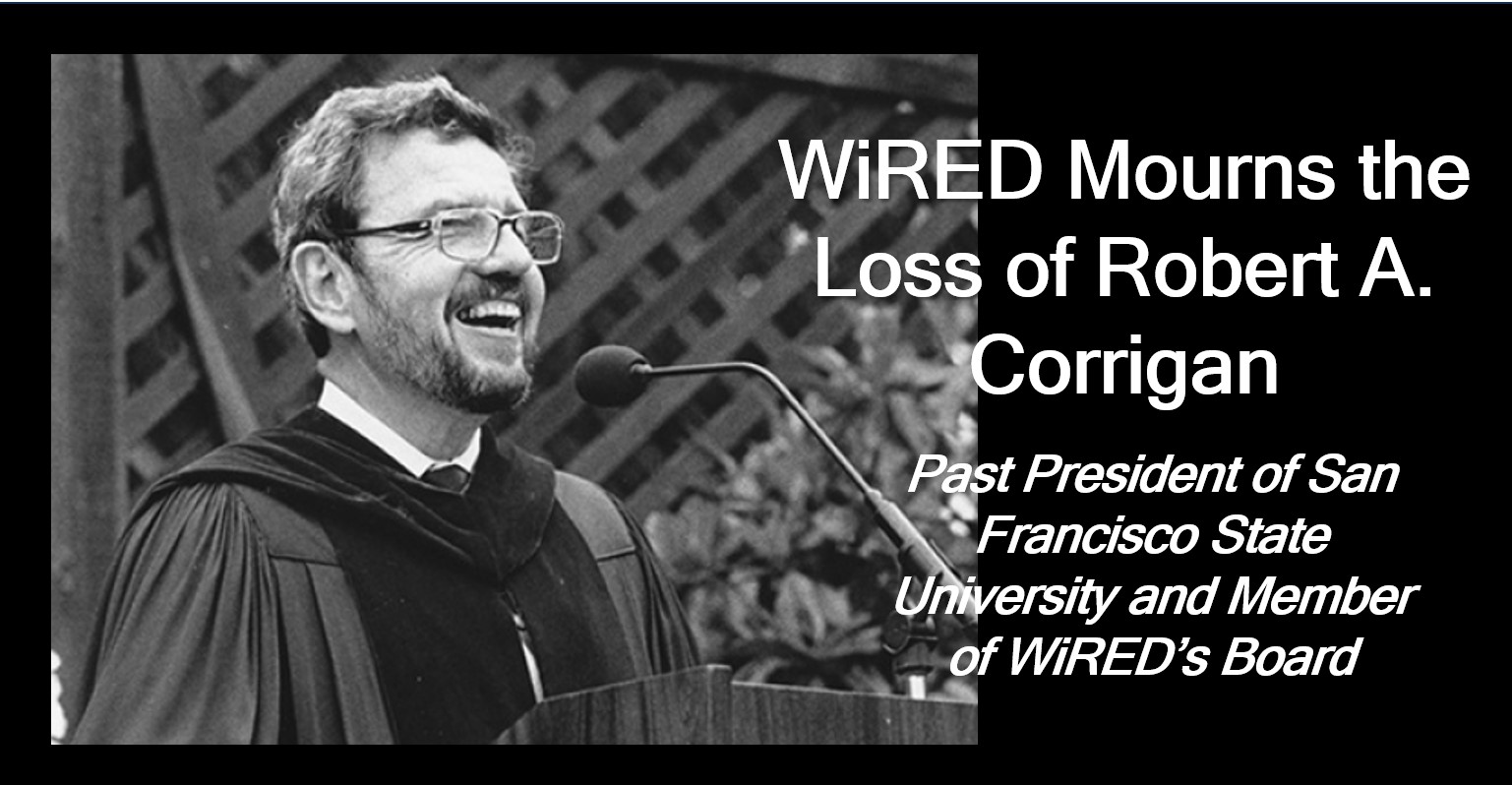By Allison Kozicharow; Edited by Elizabeth Fine
 WiRED International’s Board of Directors and volunteers are deeply saddened to note the death of Robert A. Corrigan, Ph.D. on July 5, 2024 at age 89. Dr. Corrigan served as president of San Francisco State University (SFSU) for 23 years from 1989 to 2012 and as a trusted member of WiRED’s Governing Board and then our Advisory Board for more than 12 years. According to The San Francisco Chronicle, Corrigan died “at the longtime home he shared with his wife, arts patron Joyce Mobley Corrigan, near the S.F. State campus. Corrigan had spent the last few years in a memory care facility for treatment of dementia, said his stepdaughter Erika Mobley of Burlingame.”
WiRED International’s Board of Directors and volunteers are deeply saddened to note the death of Robert A. Corrigan, Ph.D. on July 5, 2024 at age 89. Dr. Corrigan served as president of San Francisco State University (SFSU) for 23 years from 1989 to 2012 and as a trusted member of WiRED’s Governing Board and then our Advisory Board for more than 12 years. According to The San Francisco Chronicle, Corrigan died “at the longtime home he shared with his wife, arts patron Joyce Mobley Corrigan, near the S.F. State campus. Corrigan had spent the last few years in a memory care facility for treatment of dementia, said his stepdaughter Erika Mobley of Burlingame.”
WiRED Board Chair Charlotte Ferretti, Ed.D., R.N. said:
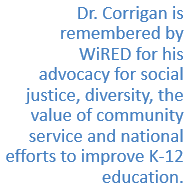 The WiRED family mourns the loss of SFSU’s President Robert A. Corrigan and his contributions to education and to WiRED as a longtime Governing Board and then Advisory Board member. Dr. Corrigan is remembered by WiRED for his advocacy for social justice, diversity, the value of community service and national efforts to improve K-12 education. In San Francisco he extended the University’s community campus vision by providing leadership to strengthen the City’s Head Start program, supporting almost 2,000 low-income children.
The WiRED family mourns the loss of SFSU’s President Robert A. Corrigan and his contributions to education and to WiRED as a longtime Governing Board and then Advisory Board member. Dr. Corrigan is remembered by WiRED for his advocacy for social justice, diversity, the value of community service and national efforts to improve K-12 education. In San Francisco he extended the University’s community campus vision by providing leadership to strengthen the City’s Head Start program, supporting almost 2,000 low-income children.
 Under his leadership, SFSU earned national recognition for its approach to education, including a designation as a Princeton Review “College with a Conscience.” The University also earned the highest federal recognition possible for its commitment to community service, a Presidential Award in President Obama’s Higher Education Community Service Honor Roll.
Under his leadership, SFSU earned national recognition for its approach to education, including a designation as a Princeton Review “College with a Conscience.” The University also earned the highest federal recognition possible for its commitment to community service, a Presidential Award in President Obama’s Higher Education Community Service Honor Roll.
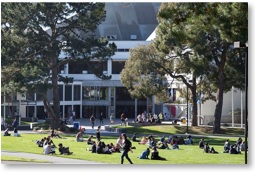 According to SF State News, “In his inauguration speech, Corrigan called for the hiring and retention of faculty reflective of the diversity of the student population. Under his leadership, the University recruited and hired 1,000 new tenured/tenure-track faculty from 1989 to 2012, when he retired. This led to a tenured/tenure-track faculty pool that was 48% women and 37% people of color by the time he passed the torch to the next president.”
According to SF State News, “In his inauguration speech, Corrigan called for the hiring and retention of faculty reflective of the diversity of the student population. Under his leadership, the University recruited and hired 1,000 new tenured/tenure-track faculty from 1989 to 2012, when he retired. This led to a tenured/tenure-track faculty pool that was 48% women and 37% people of color by the time he passed the torch to the next president.”
 Dr. Corrigan was born on April 21, 1935. He earned his A.B. from Brown University and his master’s and doctoral degrees in American Civilization from the University of Pennsylvania. Before serving as President of San Francisco State University, he was Chancellor of the University of Massachusetts, Boston from 1979 to 1988. During his distinguished academic career, he was a Provost at the University of Maryland, College Park, and held faculty positions at the University of Iowa, Bryn Mawr College, the University of Pennsylvania, and the University of Gothenburg in Sweden.
Dr. Corrigan was born on April 21, 1935. He earned his A.B. from Brown University and his master’s and doctoral degrees in American Civilization from the University of Pennsylvania. Before serving as President of San Francisco State University, he was Chancellor of the University of Massachusetts, Boston from 1979 to 1988. During his distinguished academic career, he was a Provost at the University of Maryland, College Park, and held faculty positions at the University of Iowa, Bryn Mawr College, the University of Pennsylvania, and the University of Gothenburg in Sweden.
Dr. Corrigan supported WiRED’s work since 2002 and made the presentation speech at the ceremony where WiRED was awarded the UC Berkeley Public Health Hero Award in 2009 (click here for video). He will be missed by all of WiRED’s board members who had the pleasure of knowing him.
How Dr. Robert Corrigan Joined WiRED International’s Board
By Gary Selnow, Ph.D., WiRED Executive Director
A project draws Dr. Corrigan’s attention
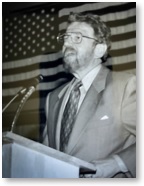 I had been working on WiRED projects throughout the former Yugoslavia since 1997 and, in 2001, I just completed a month-long project in Kosovo. This small province, squeezed uncomfortably among four large countries, suffered from ethnic cleansing and a bitter war inflicted by its powerful neighbor to the north, Serbia. Hospitals were damaged and doctors, often persecuted by Serbian forces, were unable to provide adequate care to seriously ill patients, many of them children. So, the most critically ill young patients were sent abroad for treatment; with money scarce, many went alone while their families remained in Kosovo.
I had been working on WiRED projects throughout the former Yugoslavia since 1997 and, in 2001, I just completed a month-long project in Kosovo. This small province, squeezed uncomfortably among four large countries, suffered from ethnic cleansing and a bitter war inflicted by its powerful neighbor to the north, Serbia. Hospitals were damaged and doctors, often persecuted by Serbian forces, were unable to provide adequate care to seriously ill patients, many of them children. So, the most critically ill young patients were sent abroad for treatment; with money scarce, many went alone while their families remained in Kosovo.
WiRED’s project, with the U.S. State Department and the International Organization for Migration, provided satellite connections between people in Kosovo and family members who left during the conflict. (At that time, Skype, Zoom and other plug-and-play programs were several years off.) When we learned about the children, we asked, why not use our facilities to set up video links between the children in overseas hospitals and their families back in Kosovo? They might not be together, but at least they can visit online.
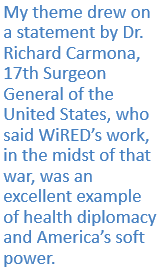 So, we made arrangements, and one of our first “Video Visits” was between parents in Prestina, the capital of Kosovo, and the Santa Chiara Hospital in Pisa Italy. A colleague in Italy, Dr. Suellen Crano, shot video of the children in the hospital, while I took video footage of the families in Kosovo. Later, we compiled the material into a brief video showing the joy of the kids and their families at seeing each other, some for the first time in nearly a year!
So, we made arrangements, and one of our first “Video Visits” was between parents in Prestina, the capital of Kosovo, and the Santa Chiara Hospital in Pisa Italy. A colleague in Italy, Dr. Suellen Crano, shot video of the children in the hospital, while I took video footage of the families in Kosovo. Later, we compiled the material into a brief video showing the joy of the kids and their families at seeing each other, some for the first time in nearly a year!
I brought that video back to San Francisco State, where I was teaching. Dr. Charlotte Ferretti, Director of the Edelman Institute at SFSU, submitted the video to a 2002 campus-wide event that displayed faculty and student community service projects.
Dr. Corrigan sees footage of the Kosovo Video Visit
Dr. Corrigan saw the video at that event. It was the first time he heard about WiRED and how an SFSU faculty member got it started. He then asked his staff to research WiRED; their report listed our projects in the former Yugoslavia, our National Institutes of Health-funded training programs in Africa and our State Department sponsored medical education efforts in Iraq.
I didn’t know about Dr. Corrigan’s positive reaction to the video or about the staff research until I received a letter from his office. It stated that he was awarding me the President’s Medal that year, a huge honor (and a surprise!). He asked me to give a speech at graduation that year, and with great public concern about the war in Iraq, I focused my talk on WiRED’s medical education programs there. My theme drew on a statement by Dr. Richard Carmona, 17th Surgeon General of the United States, who said WiRED’s work, in the midst of that war, was an excellent example of health diplomacy and America’s soft power. Dr. Corrigan, a genuine humanitarian and strong advocate for peace, told me that he supported WiRED’s work in Iraq and that he appreciated the health diplomacy emphasis in the speech. Then, for several years at Dr. Corrigan’s request, we met occasionally so I could keep him posted on our work.
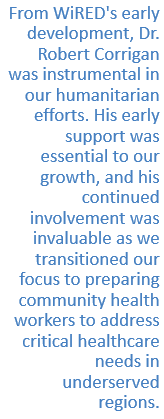 In 2009, WiRED received the Organizational Public Health Hero award from the Berkeley School of Public Health. Berkeley asked if I could recommend someone to introduce WiRED at the award ceremony. I couldn’t think of anyone better than the President of SFSU. It was a big ask, but Dr. Corrigan agreed and said he would be pleased to introduce WiRED, and to endorse an organization involving faculty at SFSU to the large Berkeley audience!
In 2009, WiRED received the Organizational Public Health Hero award from the Berkeley School of Public Health. Berkeley asked if I could recommend someone to introduce WiRED at the award ceremony. I couldn’t think of anyone better than the President of SFSU. It was a big ask, but Dr. Corrigan agreed and said he would be pleased to introduce WiRED, and to endorse an organization involving faculty at SFSU to the large Berkeley audience!
Dr. Corrigan joins WiRED’s board
After Dr. Corrigan retired as president of SFSU in 2012, I asked if he would join WiRED’s governing board. He said he had closely followed our work for more than a decade and he would be happy to sign on. And so, Dr. Corrigan joined a remarkable group of people on our board and became a notable member of our organization.
Several years later, he proposed to move from the governing board to our advisory board. He was turning to other matters in his life and felt that a smaller role at WiRED would be best. Happy to have him stay with us, we readily agree. He remained on the advisory board until his passing this year.
From WiRED’s early development, Dr. Robert Corrigan was instrumental in our humanitarian efforts. His early support was essential to our growth, and his continued involvement was invaluable as we transitioned our focus to preparing community health workers to address critical healthcare needs in underserved regions.

